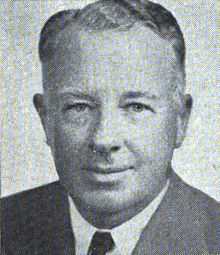Richard Thurmond Chatham
| Richard Thurmond Chatham | |
|---|---|
 | |
| Member of the U.S. House of Representatives from North Carolina's 5th district | |
| In office January 3, 1949 – January 3, 1957 | |
| Preceded by | John Hamlin Folger |
| Succeeded by | Ralph James Scott |
| Personal details | |
| Born | August 16, 1896 Elkin, North Carolina |
| Died | February 5, 1957 (aged 60) Durham, North Carolina |
| Political party | Democratic |
| Spouse(s) | Lucy Hodgin Hanes |
| Children | 3 |
Richard Thurmond Chatham (August 16, 1896 – February 5, 1957), who usually went by Thurmond Chatham, was a member of the U.S. House of Representatives, an industrialist and philanthropist. He represented North Carolina from 1949 to 1957.
Early years
Born in Elkin, North Carolina, Chatham was the only son of Hugh Gwyn and Martha Lenoir Chatham. His grandfather was Alexander Chatham, founder of Chatham Manufacturing Company. Chatham was educated in the public schools and at Woodberry Forest School in Orange, Virginia. He attended the University of North Carolina from 1915–1916 and Yale University from 1916–1917, but left college to enter the United States Navy. He served in the Navy until 1919.
Career
In July 1919, Chatham began working for his family's company, Chatham Manufacturing, which was the world's largest manufacturer of blankets. After serving as treasurer of the company, he became president in 1929 and chairman of the board of directors in 1945. During his presidency, the company experienced considerable growth.
From 1942 to 1945, Chatham served in the U.S. Navy with the Bureau of Ordnance and the office of the secretary of the Navy. He attained the rank of commander in the U.S. Naval Reserve and was awarded the Bronze Star, the secretary of the Navy's Commendation Medal, and the Royal Order of Orange-Nassau with Swords from the Dutch government.
Political life
With his only previous political experience as a county commissioner in Forsyth County, North Carolina, Chatham was unsuccessful in his 1946 bid for the Democratic nomination for Congress. He was first elected in 1948 and re-elected three more times.
While in Congress, he was a member of the House Foreign Affairs Committee and was an advocate of recognition of China and support for the Marshall Plan.
Notably, he did not sign the Southern Manifesto in 1956. As a result, Chatham lost the Democratic Party primary to Ralph James Scott.
Later years
Chatham was a trustee of the University of North Carolina and of Woodberry Forest School; president of the Winston-Salem Chamber of Commerce; and a member of the National Association of Wool Manufacturers, the American Legion, and the Veterans of Foreign Wars. In 1948, he served on the North Carolina Board of Conservation and Development and was president of the North Carolina Dairymen's Association.
Family life
In 1919, Chatham married Lucy Hodgin Hanes (1895–1949), daughter of John Wesley Hanes. The couple had two sons, Hugh Gwyn II and Richard Thurmond, Jr. After Lucy died, Chatham married Patricia Firestone Coyner in 1950. The couple had one son, Walter Firestone, born in 1952. Chatham died in Durham, North Carolina and was buried in the Salem Cemetery in Winston-Salem, North Carolina. His estate was valued at almost $2,000,000, of which $250,000 was used to establish the Chatham Foundation, a charitable trust supporting education.
References
Biography uses material from: Biographical Note, Southern Historical Collection, University of North Carolina at Chapel Hill
External links
- Congressional Biography
- Inventory of the Richard Thurmond Chatham Papers, in the Southern Historical Collection, UNC-Chapel Hill.
|